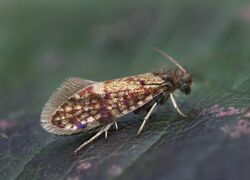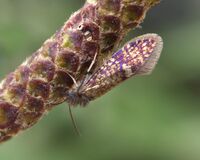Biology:Eriocrania cicatricella
| Eriocrania cicatricella | |
|---|---|

| |
| Scientific classification | |
| Domain: | Eukaryota |
| Kingdom: | Animalia |
| Phylum: | Arthropoda |
| Class: | Insecta |
| Order: | Lepidoptera |
| Family: | Eriocraniidae |
| Genus: | Eriocrania |
| Species: | E. cicatricella
|
| Binomial name | |
| Eriocrania cicatricella (Zetterstedt, 1839)
| |
| Synonyms[1] | |
| |
Eriocrania cicatricella is a moth of the family Eriocraniidae found in Europe. It was first described by Johan Wilhelm Zetterstedt in 1839. The larvae mine the leaves of birch (Betula species).[2]
Description
The wingspan is about 11 mm. The head is fuscous, somewhat mixed with grey-whitish. The forewings are rather elongate, pale shining golden, strigulated and spotted with purple and the veins posteriorly purple. There is a rather indistinct transverse dorsal spot of ground-colour before the tornus, not reaching half across wing; cilia light grey. Vein 9 is absent. The hindwings are grey, towards apex purplish-tinged. The moth flies in April around the larval food plant.
Eggs are laid in the leaf buds of birch (Betula species) and the white larvae mine the leaves in May. Larvae have swollen thoracic segments. The mine is a greenish blotch and contains two to four larvae. Several species of the Eriocraniidae may mine the same leaf and mines can merge, so care needs to be taken when identifying mines.[3][4]
Etymology
Zetterstedt originally put the moth in the genus Adela, which was raised by the French zoologist, Pierre André Latreille in 1796. The name comes from the Greek adelos, which describes the larval habit of concealing itself in a portable case; although in the case of this moth, the larvae live within the tissue of a leaf! The moth is now in the genus Eriocrania, which was raised by Philipp Christoph Zeller in 1851. Erion means wool and kranion means the upper part of the head, which refers to the hair-scales on the top of the head. The specific name, cicatricella is from cicatrix, a scar – referring to the indistinct transverse dorsal spot.[5][6]
Distribution
Eriocrania cicatricella is found from Britain and Ireland east to Russia.[1]
References
- ↑ 1.0 1.1 "Eriocrania cicatricella (Zetterstedt, 1839)". https://fauna-eu.org/cdm_dataportal/taxon/a6bc8f38-a29c-47e3-8c2e-5f5bf785373c.
- ↑ Kimber, Ian. "Eriocrania cicatricella (Zetterstedt, 1839)". https://ukmoths.org.uk/species/eriocrania-cicatricella/.
- ↑ Sale, Ben (2017). Micro-moth Field Tips. Rishton: Lancashire & Cheshire Fauna Society. p. 74. ISBN 978-1-9997312-0-5.
- ↑ "2.006 Eriocrania cicatricella (Zetterstedt, 1839)". http://www.leafmines.co.uk/html/Lepidoptera/E.cicatricella.htm.
- ↑ Smith, Frank. "Microlepidoptera (Micro-Moths)". https://cisfbr.org.uk/MICRO%20DEMO%201.pdf. Retrieved 17 April 2022.
- ↑ Emmet, A Maitland (1991). The Scientific Names of the British Lepidoptera. Their history and meaning. Colchester: Harley Books. pp. 50 & 124. ISBN 0-946589-35-6.
- Meyrick, E., 1895 A Handbook of British Lepidoptera MacMillan, London pdf
 This article incorporates text from this source, which is in the public domain. Keys and description (as purpurella)
This article incorporates text from this source, which is in the public domain. Keys and description (as purpurella)
External links
Wikidata ☰ Q1757321 entry
 |


